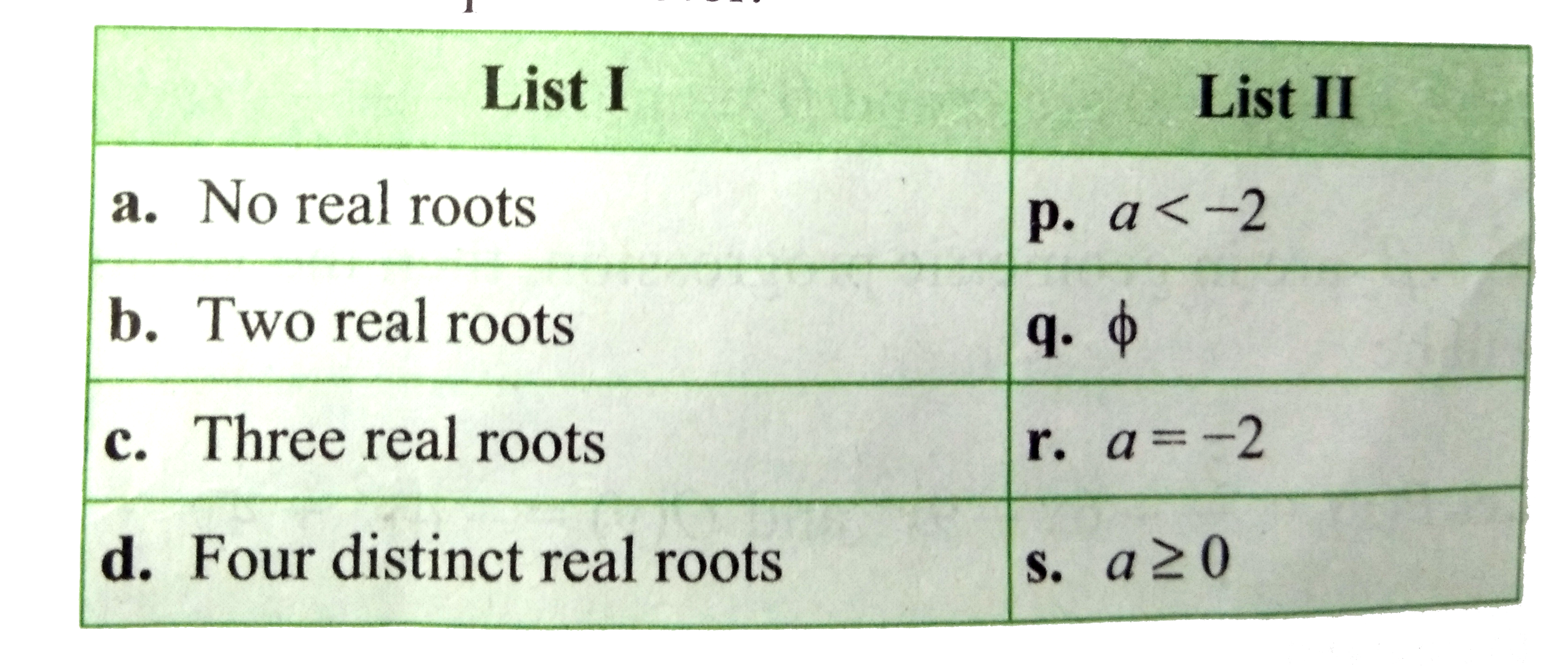a,b,andc are all different and non-zero real numbers on arithmetic progression. If the roots of quadratic equation ax2+bx+c=0areαandβ such that 1α+1β,α+β,andα2+β2 are in geometric progression the value of a/c will be_____.Solution in Bengali
The correct Answer is:3
We have (α+β)2=(1α+1β)(α2+β2)
⇒(α+β)2=(1α+1β)[(α+β)2−2αβ]
Substiting α+β=−baandαβ=ca we have
⇒cb2+b(b2−2ac)=0
b≠0,∴bc+b2−2ac=0 a, b, c are in AP, ∴b=a+c2
Therefore, we have (a+c)c2+(a+c2)2−2ac=0
⇒a2−4ac+3c2=0or(a−c)(a−3c)=0
a≠c∴a=3c∴ac=3
Topper's Solved these Questions
- THEORY OF EQUATIONSBook:CENGAGE PUBLICATIONChapter:THEORY OF EQUATIONSExercise:Archives JEE MAIN (single correct Answer Type )
Explore 7 Videos
- THEORY OF EQUATIONSBook:CENGAGE PUBLICATIONChapter:THEORY OF EQUATIONSExercise:JEE ADVANCED (Single Correct Type )
Explore 5 Videos
- THEORY OF EQUATIONSBook:CENGAGE PUBLICATIONChapter:THEORY OF EQUATIONSExercise:MATRIX MATCH TYPE
Explore 6 Videos
- STRAIGHT LINESBook:CENGAGE PUBLICATIONChapter:STRAIGHT LINESExercise:ARCHIVES (NUMERICAL VALUE TYPE)
Explore 1 Video
- THREE DIMENSIONAL GEOMETRYBook:CENGAGE PUBLICATIONChapter:THREE DIMENSIONAL GEOMETRYExercise:All Questions
Explore 291 Videos
Similar Questions
If the roots of the equation bx2+cx+a=0 be imaginary, then for all real values of x, the expression 3b2x2+6bcx+2c2 is (1) greater than 4ab (2) less than 4ab (3) greater than −4ab (4) less than 4ab
View SolutionQ. Let p and q real number such that p≠0,p2≠q and p2≠−q. if α and β are non-zero complex number satisfying α+β=−p and α3+β3=q, then a quadratic equation having αβ and βα as its roots is
View SolutionMatch the following for the equation x2+a|x|+1=0 where, a is a parameter.

View SolutionFor a point P in the plane, let d1(P)andd2(P) be the distances of the point P from the lines x−y=0andx+y=0 respectively. The area of the region R consisting of all points P lying in the first quadrant of the plane and satisfying 2≤d1(P)+d2(P)≤4, is
View SolutionFind the angle between the line whose direction cosines are given by l+m+n=0andl2+m2−n2=0.
View SolutionIf alpha and beta are the roots of the equation x^(2)-ax+b=0 and A_(n)=alpha^(n)+beta^(n)
View Solutiona,b,and c are all different and non-zero real numbers on arithmetic progression. If the roots of quadratic equation ax2+bx+c=0 are α and β such that 1α+1β,α+β,andα2+β2 are in geometric progression the value of a/c will be_____.
View SolutionIf alpha,beta are non-real roots of ax^(2)+bx+c=0,(a,b,c in R), then (A)alpha beta=1(B)alpha=beta(C)(a beta)/(alpha beta)=1(D)alpha=bar(beta)
View SolutionIf αandβ are the roots of the equation x2+x+c=0 such that α+β,α2+β2andα3+β3 are in arithmetic progression, then c is equal to
View Solutiona,b,and c are all different and non-zero real numbers on arithmetic progression. If the roots of quadratic equation ax2+bx+c=0 are α and β such that 1α+1β,α+β,andα2+β2 are in geometric progression the value of a/c will be_____.
View SolutionIf α,β are the roots of the quadratic equation ax2+bx+c=0 , then which of the following expression will be the symmetric function of roots a. ∣∣∣log(αβ)∣∣∣ b. α2β5+β2α5 c. tan(α−β) d. (log(1α))2+(logβ)2
View SolutionLet α,β∈R. If α,β2 are the roots of quadratic equation x2−px+1=0andα2,β is the roots of quadratic equation x2−qx+8=0 , then the value of rifr8 is the arithmetic mean of pandq, is
View SolutionIf alpha, beta are the roots of a x2+bx+c=0 and An=αn+βn, then, aAn+2+bAn+1+cAn=
View SolutionIf α,β are the roots of the quadratic equation x2+bx−c=0, the equation whose roots are b and c, is a. x2+αx−β=0 b. x2−[(α+β)+αβ]x−αβ(α+β)=0 c. x2+[(α+β)+αβ]x+αβ(α+β)=0 d. x2+[(α+β)+αβ)]x−αβ(α+β)=0
View SolutionLet α and β are roots of equation x2−x−1=0 with α>β. For all positive integers n defines an=αn−βnα−β , n>1 and b=1 and bn=an+1+an−1 then
View SolutionIf αandβ are the roots of the equation x2+x+c=0 such that α+β,α2+β2andα3+β3 are in arithmetic progression, then c is equal to
View Solution